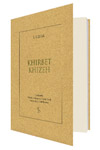Given its recurring relevancy, it’s a wonder that an English translation of the 1949 Israeli novella Khirbet Khizeh, described in an afterword as a canonical text and part of the standard curriculum in Israeli high schools, has not appeared until now. The author, longtime Knesset member Yizhar Smilansky, known by the pen name S. Yizhar, fought in the 1948–49 Arab-Israeli War that ended with the expulsion of Palestinian Arabs from cities and villages in Israel. His novella describes one such brutal expulsion. Yizhar is also the author of a thousand-plus-page novel called Days of Tziklag about the 1948 war, and this skillful and entrancing translation of Khirbet Khizah, eminently worthwhile in its own right, makes a strong case for seeking out the lengthier work.
The soldier-narrator at the center of this incrementally unfolding tragedy shares with his platoon-mates a sense of revulsion for the battered Palestinian villagers, which underscores the injustice of the soldiers’ mission. Their reaction to two old women, abandoned at a roadside, is not exactly sympathetic: “What could you do with them but spit in disgust, and gag, and not look, and run from here—the horror!” The horror is not unrelieved, and never far off. Yizhar jams magnificently lyrical descriptions of nature hard up against passages of marshal reality. Thus an idyllic description of a peaceful rural valley “warming itself in the after- rain sun, gazing in total silence toward the light and the gold, throbbing” is instantly upended by an exchange in which an Israeli soldier curses the Arabs for the beauty of the places they “have,” and a comrade responds with the correction “had,” adding, “It’s already ours.”
Yizhar’s prose has an onrushing, self-correcting extensiveness—and not just in the lyrical passages—that recalls Proust and Céline, which makes some sense given its mid-century publication date. At the same time, it hints at the Latin American and European innovations that would soon follow:
And immediately that white-turbaned yellow-sashed man began to lecture to us about how there weren’t any young people left in the village, only old men, women, and children, and how he’d tried to persuade the ones who had fled that morning not to go, because the Jews didn’t do bad things, because the Jews were not like the English, God curse their fathers, nor like those dogs, the Egyptians, etc., etc., clinging and speaking to anyone who seemed to be listening or who might listen, and finally someone pushed him in the middle of his torrent and said to him brusquely that he should go over there and shut up.
The seductive rhythms of Yizhar’s sentences, full of precise observations and touching details, always fall off into disaster, disgust, scorn, and horror. An admiring description of the care with which the villagers of Khirbet Khizeh had organized the fields surrounding their village, allowing them to make the most of agricultural, meteorological, and market cycles, ends by pointing out “the one calculation that they had failed to make,” that of their sudden dispossession.
The entire novella, canonical in Hebrew literature, has the effect of pointing up how brutally unjust visitations of war inevitably are upon civilian populations, and how brutally coarsened soldiers must become to carry out the “operational order[s]” that steer, in the sanitized language of the generals and politicians who decide such things from a distance, the broad and heartless missions of armies.





